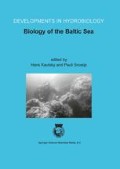Abstract
According to conventional wisdom, the brackish water ecology of the Baltic, like all ecology, is a secondary science. That is, the phenomena it considers can be decomposed into series of more elementary events acting under a sequence of laws that culminates either in the netherworld of quantum physics or in the realm of the cosmological. Ecology, however, is not a derivative science; it is fundamental in its own right. The Baltic ecosystem, for example, is a complex system of many-components. Using combinatorics one may argue that most of the whole-system configurations which ecologists encounter comprise unique and original events that elude treatment via the conventional Baconian approach. Chaos does not reign, however, because there exist among the populations of the ecosystem self-reinforcing mutualistic loops that exert a form of selection upon their constituent members quite different from the ‘natural selection’ of evolutionary theory. This feedback gives rise to what Karl Popper described as ‘propensities’ that serve in contingent systems in lieu of conventional forces to maintain the coherence of the ecosystem. The ensuing autonomous ‘ecodynamics’ can be quantified using information theory, resulting in measures that can be used to compare the status of the Baltic ecosystem with those of similar bodies of water, such as Chesapeake Bay.
Access this chapter
Tax calculation will be finalised at checkout
Purchases are for personal use only
Preview
Unable to display preview. Download preview PDF.
References
Dennett, D. C., 1995. Darwin’s Dangerous Idea: Evolution and the Meanings of Life. Simon and Schuster, New York.
Elsasser, W. M., 1981. Principles of a new biological theory: a summary. Journal of Theoretical Biology 89: 131–150.
Hoffmeyer, J., 1993. Signs of Meaning in the Universe. Indiana University Press, Bloomington, Indiana.
Holling, C. S., 1986. The resilience of terrestrial ecosystems: local surprise and global change. In Clark, W. C. R. E. Munn (eds), Sustainable Development of the Biosphere. Cambridge University Press, Cambridge: 292–317.
Lindeman, R., 1942. The trophic-dynamic aspect of ecology. Ecology 23: 399–418.
Popper, K. R., 1982. The Open Universe: an Argument for Indeterminism. Rowman and Littlefield, Totowa, New Jersey.
Popper, K. R., 1990. A World of Propensities. Thoemmes, Bristol.
Rosen, R., 1985. Information and complexity. In Ulanowicz, R. E. T. Platt (eds), Ecosystem Theory for Biological Oceanography. Canadian Bulletin of Fisheries and Aquatic Sciences 213: 221– 233.
Rosen, R., 1991. Life Itself: a Comprehensive Inquiry into the Nature, Origin, and Fabrication of Life. Columbia University Press, New York.
Ulanowicz, R. E., 1995. Utricularia’s secret: The advantages of positive feedback in oligotrophic environments. Ecological Modelling 79: 49–57.
Ulanowicz, R. E., 1997. Ecology, the Ascendent Perspective. Columbia University Press, New York
Ulanowicz, R. E., 1999. Life after Newton: An ecological metaphysic. BioSystems 50: 127–142.
Ulanowicz, R. E., 2001. The organic in ecology. Ludus Vitalis 15: 183–204.
Ulanowicz, R. E. J. S. Norden, 1990. Symmetrical overhead in flow networks. International Journal of Systems Science 21: 429–437.
Ulanowicz, R. E. F. Wulff, 1991. Comparing ecosystem structures: The Chesapeake Bay and the Baltic Sea. In Cole, J., G. Lovett S. Findlay (eds), Comparative Analyses of Ecosystems: Patterns, Mechanisms, and Theories. Springer-Verlag, New York: 140–166.
Author information
Authors and Affiliations
Editor information
Editors and Affiliations
Rights and permissions
Copyright information
© 2004 Springer Science+Business Media Dordrecht
About this paper
Cite this paper
Ulanowicz, R.E. (2004). New perspectives through brackish water ecology. In: Kautsky, H., Snoeijs, P. (eds) Biology of the Baltic Sea. Developments in Hydrobiology, vol 176. Springer, Dordrecht. https://doi.org/10.1007/978-94-017-0920-0_1
Download citation
DOI: https://doi.org/10.1007/978-94-017-0920-0_1
Publisher Name: Springer, Dordrecht
Print ISBN: 978-90-481-6550-6
Online ISBN: 978-94-017-0920-0
eBook Packages: Springer Book Archive

